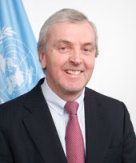Colonel Harun finally left PTK on January 29th. There is no mention in the Weiss narrative of the UN engineer who had volunteered to stay behind. There is also no mention of the way in which he got away.
Weiss notes that ‘the ICRC and the UN were able to negotiate the evacuation of hundreds of seriously wounded’. He does note that ‘The Tamil Tigers had refused the request for days’, but omits to mention that the army had been supporting this request, and had indeed suspended operations on previous days when it was told the Tigers were about to agree, only for hopes to be repeatedly dashed.
Weiss also omits to record that the UN, together with the Sri Lankan government, had been trying to negotiate for more supplies of food to be sent in. It was with that convoy that Harun was supposed to come back, since that was a UN responsibility, but the Tigers refused the request. It was then that Harun was advised, by the forces, to drive out when the ICRC convoy was allowed to move. When he arrived  in Vavuniya, he said that he had been refused permission to leave by the LTTE but that, as advised by the army, he had told them to shoot if they wanted, but he was leaving. Those who briefed me from the army described him as being immensely relieved when he reached their headquarters. With him they recollect was the Sri Lankan Suganthan who migrated to Canada about a month later.
in Vavuniya, he said that he had been refused permission to leave by the LTTE but that, as advised by the army, he had told them to shoot if they wanted, but he was leaving. Those who briefed me from the army described him as being immensely relieved when he reached their headquarters. With him they recollect was the Sri Lankan Suganthan who migrated to Canada about a month later.
It should be noted that two drivers had stayed behind when the other UN employees left over a week earlier. Weiss does not mention them, but it seems they chose to remain because their families were in the Wanni, and were not allowed out. They came out subsequently, along with their families – as noted, though this is ignored in the allegations that civilians were indiscriminately targeted, all these people survived, including the child the LTTE forcibly recruited.
The effort of the Sri Lankan government to send food in is also ignored, and instead the Darusman Panel has built up an enormous myth about how government ‘systematically deprived persons in the conflict zone of humanitarian assistance’. This is complete nonsense since, while there is ample evidence that government was ready with stocks of food throughout, it was the LTTE that frequently refused permission for such supplies to be taken in. This is of a piece with its attacks on food ships to Jaffna, and its refusal, after just one such successful trip, to let the ICRC escort supply ships to Jaffna. Despite this, the Commissioner General of Essential Services managed to keep supplies going to Jaffna throughout the conflict, so that an international assessment noted that all food items were available and most were affordable.
The efforts of the LTTE to restrict food to the Wanni were also apparent in its refusal to allow the road northward into the Wanni to be open more than three days a week, until the Peace Secretariat raised the issue with the ICRC and at the Consultative Committee on Humanitarian Assistance. When I first broached the issue, the ICRC did not reply in writing but asked to meet me, and explained that they could not supervise such an opening unless both parties agreed. They refused to say direct that the LTTE did not allow permission, since their dealings were confidential, but they did not demur when I pointed out that, since I had made a request, on behalf of government, having got clearance for this from the Ministry of Defence, it was obvious who was creating the problem.
They promised to negotiate further, but when nothing happened, I brought the matter up at the CCHA and had it minuted, and the Secretary of Defence made it clear that he would be very happy, for his part, to open the road northward from Omanthai seven days a week. I had to insist that this be minuted, for by this stage one branch of the UN was trying to persuade me to buy a scanner so that vehicles could be cleared more quickly for transiting the checkpoint on the three days that were available.
I pointed out that the cost was exorbitant, but the Head of UNOPS said they could find the money. I then pointed out that such instruments were delicate, and could go out of order if there were any explosions nearby, but he said it

Sir John Holmes - United Nations Under-Secretary-General for Humanitarian Affairs and Emergency Relief Coordinator
could be replaced. It was then that I realized how freely the UN wasted money, when what they should have been doing was ensuring that the road was opened all week. I am afraid I also thought of how my father had noticed that all politicians liked having power with regard to procurement, and I suspect there is something of this in UN officials too.
But with the public recording of the willingness of the Sri Lankan government to open the road daily – the request was made at the CCHA meeting which Sir John Holmes attended – the LTTE bluff was called, and soon after it was announced that the road would be open six days a week. Allegations of shortages – which had in fact been avoided by Mr Divaratne’s skilful management of supplies – stopped after that, to start again only when the LTTE began its game of holding hostages to be used as human shields.




No comments:
Post a Comment